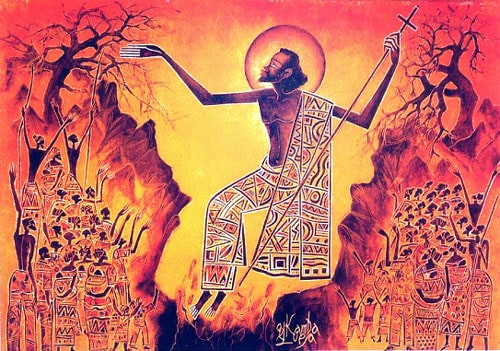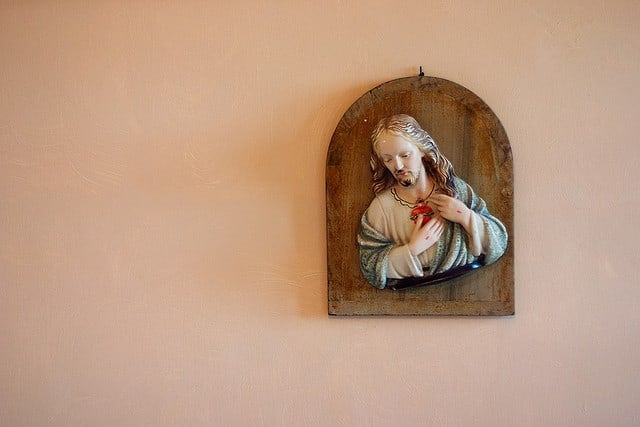“Mr. Rossmann, why are most saints white?”
“Why has there never been a black pope?”
“Was Jesus white?”
“Was Jesus black?”
I teach sophomore religion here at Loyola High in Dar es Salaam. And while the inquisitiveness of 16-year-olds is probably universal, some of their particular questions are not. By my rough count I’m asked why priests aren’t allowed to get married as often here as if I were teaching in the States. It’s when my students ask me questions like the ones above, though, that I’m reminded of how far I am from the nearly all-white Catholic high school I attended.
Images are powerful. And while it is possible to find black representations of Jesus, far more common in East Africa is the “surfer Jesus,” with skin paler and hair blonder than probably anyone in the ancient Near East.
After some months of regularly welcoming their questions in the Catholic religion class I teach, I recently decided to turn the tables on them and ask them a few of my own: Do images of Jesus and Mary that are almost always white affect your understanding of what it means to be black and holy? What would you feel if we had an African pope?
I honestly expected this to be a source of frustration for my students, and while one did express dissatisfaction with how Jesus is often painted as white (while Satan is depicted as black), nearly all my students said there was no issue. “God loves all people no matter their color,” they said. And: “all people are welcome to live holy lives.” As one of my students put it, “Someone can be black and be a sinner or saint, and someone can be not-black but be a great sinner or saint.” For them, they felt no conflict in being a dedicated Catholic even when most of the images of Jesus they see, and even many of the most visible church leaders, do not look like them.1
I should have known. There is a vitality in the church here that is often more difficult to see back home. Parishes are packed on Sunday – especially with twenty- and thirty-somethings! In the pews black hair outnumbers gray hair more than twenty to one.
Moreover, I have no doubt this will continue no matter who our next pope is, just as the church in Africa has boomed throughout the last hundred years, even with European leadership.
Their ability of intelligent youths to see to the heart of the matter, as my students have regarding race and holiness, is one thing. Whether they’d want an African Pope is another.2 And, as I’ve come to expect, I found their answers revealing. Here’s a smattering of what they said.
- “I would feel good if we had an African pope because we Africans are beautiful and good people, and we were born to serve others and respect others.”
- “I would feel that they would be taking a step forward to reduce racism in the Catholic Church.”
- “I would feel happy and proud because I would see that Africans are valued and can be given responsibilities just as the white people.”
- “I would feel that justice is done.”
- “It would be proof that we are also people as others are.”
It was wonderful to listen to them. At one point a student who had, earlier in the discussion, insisted that “it doesn’t matter if you are blue, yellow, or black as long as you are made in the image of God and know that God loves you” also said that he would “go to church every day just because we have an African pope who is black like us.”
Of course, we are looking for a pope, not a race or nationality. And the Holy Spirit is not punching chads, or taking opinion polls to measure which candidate’s got the papal buzz – at least I don’t think that’s how it works. (Nota bene: which does not mean that the Holy Spirit is not listening.) Still, I would be stunned if those through whom the Holy Spirit will be working fail to contemplate the significance of electing a pope from outside of Europe – most especially from the global south, where the Church is experiencing incredible growth.
The other day I came across a poll that indicated that a quarter of Americans would like to see an American pope. If the expressed feelings of my students are any indication, however, the numbers here who would like to see a fellow African are much, much higher, and far more fervently felt.
We are waiting for a pope to lead a diverse, universal flock. If the Vicar of Christ looks a whole lot different than most images of Christ, my students indicate the impact would be tremendous.
— — — — —
- Yes, it’s true that they’re still teenagers and aren’t yet aware of what they’re not aware of – i.e., how deeply racism and colonialism have shaped their lives and options without them (yet) being aware of it. Three responses to that fair point: (1) that’s true of all of us; (2) they’re still in high school – one step at a time; and (3) let’s not be too quick to presume that they don’t mean what they say. ↩
- For a good analysis of the interest in an African pope and for a description of one of the most frequently mentioned African papabili, check out John Allen’s article on Peter Turkson from Ghana. ↩




